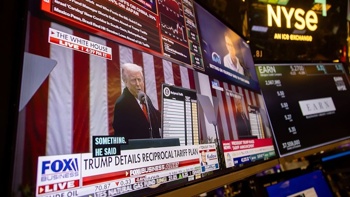President Joe Biden on Thursday sought to clarify his stance on a potential Russian incursion in Ukraine, cleaning up remarks from the prior day's news conference during which he suggested a "minor incursion" by Russia would elicit a lesser response than a full-scale invasion of the country.
"I've been absolutely clear with President Putin. He has no misunderstanding. If any -- any -- assembled Russian units move across Ukrainian border, that is an invasion. But it will be met with severe and coordinated economic response that I've discussed in detail with our allies, as well as laid out very clearly for President Putin," Biden said at the top of an event aimed at promoting the bipartisan infrastructure package passed last year.
If Putin chooses to invade, Biden added, "Russia will pay a heavy price."
During the news conference Wednesday, the President predicted Putin would "move in" to Ukraine -- though he speculated that the Russian leader is still not clear on what he's going to do. In a comment that sent shockwaves across Europe, Biden then alluded to disunity among US allies about how to respond to anything less than a full invasion.
"It's one thing if it's a minor incursion and we end up having to fight about what to do and not do," Biden told reporters at an East Room news conference. "But if they actually do what they're capable of doing with the forces amassed on the border, it is going to be a disaster for Russia if they further invade Ukraine."
Later, asked to clarify what he meant by "minor incursion," Biden said he drew the line at "Russian forces crossing the border, killing Ukrainian fighters."
"I think that changes everything," the President said. "But it depends on what he does, to what extent we'll get total unity on the NATO front."
"It's very important that we keep everyone in NATO on the same page. That's what I'm spending a lot of time doing, and there are differences," he went on. "There are differences in NATO as to what countries are willing to do, depending on what happens."
The remarks prompted near-immediate outcry in Kyiv, where officials had been meeting with Biden's top diplomat, Secretary of State Antony Blinken, as Russian troops amass on the country's border. High-level attempts to clean up the comment soon followed at the White House, including a Wednesday evening statement from press secretary Jen Psaki, and subsequent media appearances by Psaki and Vice President Kamala Harris on Thursday morning.
In a subtle but strongly worded tweet Thursday, Ukrainian President Volodymyr Zelensky issued a "reminder" to the US.
"We want to remind the great powers that there are no minor incursions and small nations. Just as there are no minor casualties and little grief from the loss of loved ones. I say this as the President of a great power," Zelensky said.
And his foreign minister, Dmytro Kuleba, warned in a virtual press briefing that a country "can't be half invaded."
"One can't be half invaded or half aggressive. Aggression is either there or not. And we can say as a concrete fact that the aggression of the Russian Federation against the state of Ukraine has been going on since 2014," Kuleba said.
As he sought to clean up his previous remarks, Biden noted that Russia has a "long history" of using measures other than overt military action to carry out aggression, including paramilitary tactics, so-called gray zone attacks, attacks by Russian soldiers not in uniform, little green men and cyberattacks.
"We have to be ready to respond to these as well and decisively," Biden said, echoing comments made late Wednesday and earlier Thursday by Psaki and Harris.
He noted that Kuleba said Thursday that he is "confident of our support and resolve and he has a right to be."
- By Betsy Klein, CNN
Take your Radio, Podcasts and Music with you









